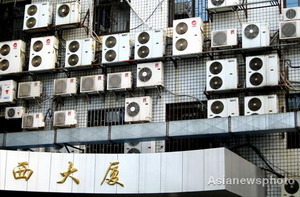Investors get their teeth into 'dim sum' bonds in HK
Updated: 2011-09-02 15:52
By Fion Li and Lilian Karunungan (China Daily)
|
|||||||||||
|
 |
|
An advertisement promotes yuan-denominated bonds in Hong Kong. Locally known as "dim sum" bonds, demand for the debt in Hong Kong rose in August, partly thanks to a stronger renminbi. [Photo / Agencies] |
HONG KONG - Yuan-denominated bond sales in Hong Kong rebounded in August from a four-month low. The rebound came as regulators eased concerns that they were cracking down on transfers of funds into the Chinese mainland.
Also known as "dim sum" bonds, yuan-denominated bonds, excluding government sales, doubled to 19.5 billion yuan ($3 billion) last month, from July's 9.5 billion yuan, data compiled by Bloomberg show.
"In terms of our pipeline, it's very strong," said Diederik Werdmolder, managing director of fixed income in Hong Kong at SinoPac Securities (Asia) Ltd.
Investors funding themselves in dollars earned 0.9 percent on the debt, according to the HSBC Offshore Renminbi Bond Index, compared with an 8.5 percent drop in the city's Hang Seng Index of stocks.
The mainland's onshore local-currency bonds fell 0.3 percent and Russia's lost 0.5 percent, while Brazil and India's gained 1.3 percent, according to indexes from JPMorgan Chase & Co.
The yuan climbed 0.9 percent last month, the most in Asia excluding Japan's yen, bolstering demand for dim sum debt among global investors, whose access to the mainland's onshore financial markets is restricted.
On Aug 17, Vice-Premier Li Keqiang pledged that the mainland will encourage overseas direct investment in yuan and draft rules were published days later explaining the approval process for bringing funds across the border.
Companies may use yuan raised through cross-border trade settlements or offshore yuan debt sales to invest on the mainland, according to the draft rules published by the Ministry of Commerce on Aug 23.
The funds may not be used to buy domestic securities and financial derivatives or to repay debt, according to the rules.
Concern that the government will crack down on bringing funds to the mainland were stoked last month, as Credit Agricole CIB wrote in a report that the mainland will probably restrict remittances of yuan to fight "hot money inflows", curbing issuance of dim sum debt. The People's Bank of China suspended applications from domestic companies to borrow yuan overseas for purposes other than trade financing in mid-July, the Shanghai Securities News reported on Aug 2.
But "Li's comments showed the central government's support for the growth of the offshore yuan market and the willingness to roll out more measures whenever the market needs", said Becky Liu, a strategist at HSBC Holdings Plc in Hong Kong, the largest underwriter of dim sum bonds this year. Even so, the mainland may "maintain a relatively tight grip over" approvals for investing proceeds on the mainland, she said.
HSBC forecasts dim sum bond sales of as much as 230 billion yuan this year, from 42 billion yuan last year.
MOF deal
The sale of yuan-denominated bonds by the Ministry of Finance (MOF) to individuals in Hong Kong attracted orders for four times the amount offered.
Total applications to buy 20.2 billion yuan were received for the 5 billion yuan available, according to a statement on the ministry's website.
"Many favorable factors including the plunge in equity markets and the low interest returns on yuan deposits in Hong Kong boosted demand," said Andy Wong, a strategist at ICBC (Asia) Ltd in Hong Kong. "To Hong Kong retail investors, the MOF bonds are more of a safe haven than US Treasuries. They provide attractive yields, taking into account yuan appreciation."
Bloomberg News













